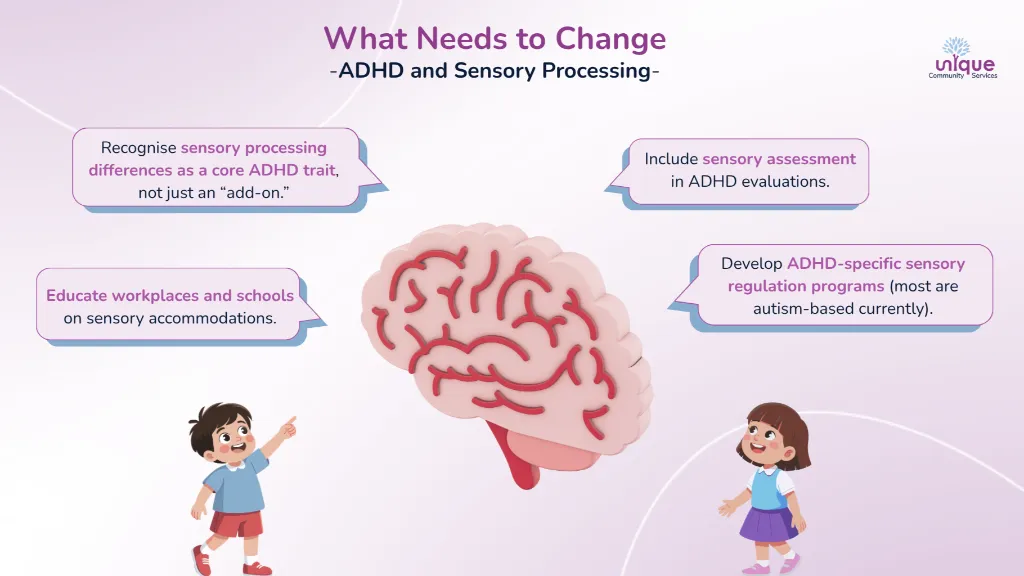What is AuDHD?
AuDHD is an informal term used by the neurodivergent community to describe people who are both autistic and have attention deficit hyperactivity disorder (ADHD) – a dual neurotype. Research indicates a substantial overlap between autism and ADHD, with 50% to 70% of autistic individuals also meeting the criteria for ADHD. While not formally recognised in clinical settings, AuDHD has gained popularity as a way for individuals to articulate their unique neurological profiles, highlighting the interconnected nature of autism and ADHD.
Individuals with AuDHD may face challenges based on the dual diagnosis (ADHD diagnosis and autism diagnosis) and the associated stigma linked to both Autism and ADHD. The world, designed with the preferences of neurotypical individuals, presents additional challenges for individuals with neurodivergent differences. “Neurotypical” refers to people with typical neurological development, while “neurodivergent” encompasses people who think and experience the world differently. Although support groups can be valuable resources, there’s a noticeable lack of groups specifically addressing AuDHD, potentially leading people to feel compelled to prioritise one diagnosis over the other.
AuDHD manifests uniquely in each person, showcasing distinct patterns in attention allocation and a tendency for intense emotions. Consequently, developing support plans strongly recommends a personalised and person-centred approach. This tailored approach ensures that people can effectively pursue and achieve their goals while navigating the challenges of this neurodivergent difference.
AuDHD Symptoms and Traits
Navigating life with AuDHD involves understanding the overlapping symptoms of both autism and ADHD traits, which can present a distinctive set of challenges and strengths for people. Autistic people typically lean towards routines, consistency, predictability, and sustained interests. In contrast, people with ADHD often thrive in environments offering stimulation, variety, and chances for creativity. AuDHD thus presents a combination of these traits, where individuals may crave routine but encounter disruptions easily.
Symptoms of AuDHD include:
- Impulsivity
- Learning differences
- Social difficulties
- Inattention
- Emotional dysregulation
- Stimming behaviours
- Sensory challenges
- Executive function challenges
Traits of AuDHD include:
- Behavioural and Daily Living traits (Need for predictability, resistance to sudden change, cycling between interests, irregular sleep patterns, etc.)
- Cognitive traits (Forgetfulness, hyperfocus, mental paralysis (“knowing what to do but can’t do it”), task initiation difficulties, etc.)
- Sensory traits (Sensory hypersensitivity and hyposensitivity, overwhelm in noisy or bright environments, meltdowns or shutdowns from overstimulation, etc.)
- Social and Communication Traits (Difficulty with small talk, trouble reading social cues, social exhaustion, withdrawal to avoid misunderstanding, etc.)
- Emotional traits (Intense emotions, Emotional dysregulation, Quick mood shifts, rejection sensitivity, etc.)

Challenges of AuDHD
The manifestation of unique thinking styles characterised by unconventional problem-solving and perception approaches is a strength of AuDHD. However, it can lead to additional challenges in education and employment if approaches are not tailored to the person or inclusive. Another prominent challenge is sensory overload, resulting from the overlap of autism-related sensitivities and ADHD-related impulsivity and hyperactivity. Social interaction challenges also contribute to difficulties building and sustaining relationships, with people often struggling to understand social cues and norms. Additionally, people frequently mask some behaviours with AuDHD that add complexity to their interpersonal interactions.
Diagnostic Challenges
AuDHD is not recognised as an official or clinical diagnosis, but individuals can be diagnosed with both autism and ADHD separately. The diagnostic process for people requires a comprehensive assessment, considering many factors, behaviours, and developmental histories. The diverse manifestations of AuDHD pose an additional challenge, given the differing symptoms of autism and ADHD, making it challenging to establish standardised diagnostic criteria. Also, coexisting conditions like anxiety, depression, or learning disabilities commonly accompany AuDHD.
Continuous updates in diagnostic criteria evolution demand that healthcare professionals stay informed about the latest research and guidelines. Addressing these diagnostic challenges requires a collaborative, multidisciplinary approach involving psychologists, developmental specialists, educators, and other relevant professionals.
Difference Between AuDHD and ADHD
Challenges with attention, hyperactivity, and impulsivity are common for people with ADHD. On the other hand, AuDHD introduces an additional layer of complexity by combining the distinctive symptoms and traits of autism. People with AuDHD encounter a combination of symptoms, including attentional difficulties, sensory sensitivities, and challenges in social communication. The coexistence of autism and ADHD links the diverse cognitive patterns and behaviours associated with each neurotype. Consequently, tailored interventions and personalised approaches are important to improve quality of life.
ADHD with Autistic Traits (ako ne e repetitive so pogore, ni treba ovoj kivord)
ADHD, as a neurodevelopmental difference, affects attention, impulsivity and emotional regulation in people experiencing it. Some people live with ADHD and also show autistic traits or features that are commonly seen in autism, but not to the degree that meets diagnostic criteria for autism. Mostly, this is recognised as ADHD with autistic traits.
Both ADHD and autism share overlapping neurological features and genetic factors. Research shows that the two conditions often occur together or show partial overlap on the neurodiversity spectrum, which explains why an ADHD profile can include some autistic-like behaviours or traits. ADHD with autistic traits brings its own strengths and positives, and challenges as well. This difference brings deep empathy and insights into others’ emotions, passionate, creative, sustained focus of interests, and, in the meantime, can bring emotional exhaustion from masking social or sensory difficulties.
ADHD and Sensory Processing
While sensory processing difficulties are officially part of the autism diagnostic profile, research shows they’re just as common in ADHD, but less recognised. Up to 60–70% of children and adults with ADHD show atypical sensory processing, while around 50% of adults with ADHD report over-responsivity to noise and touch, similar to autistic profiles. Sensory under-responsivity (not noticing sensations) is also high in ADHD, contributing to risk-taking and craving stimulation.
So, why are ADHD and sensory processing often missed clinically? Amongst the most common reasons:
- Sensory challenges aren’t considered part of ADHD diagnostic criteria, so clinicians rarely assess them.
- Many sensory behaviours (fidgeting, moving, noise sensitivity) are written off as “classic ADHD hyperactivity.”
This leads to under-recognition of sensory burnout, where unmanaged sensory strain leads to exhaustion, anxiety, and emotional dysregulation. When sensory needs are supported (e.g., noise control, movement breaks, soft fabrics, adjustable lighting), ADHD symptoms often improve, particularly focus and emotional stability.
💡 Important takeaway:

Treatment and Support Approaches
Treatment and support for individuals with AuDHD include proactive approaches. Cognitive Behavioural Therapy (CBT) is a valuable tool, providing individuals with strategies to manage emotions, improve focus, and harness creativity. This therapy offers a gradual skill development process under the guidance of trained professionals. Executive Function Therapy (EFT) is specialised in improving the cognitive skills that help people manage life effectively. It allows individuals to strengthen executive function skills such as task organisation, time management, and attention control.
Psychoeducation plays a vital role in offering information and empowerment to supported people, families, or groups regarding mental health challenges associated with AuDHD. Educational and vocational support tailored to individual needs ensures success in learning or working environments. Medical treatments to manage ADHD symptoms are also recommended. However, these medications are most effective when combined with other strategies, such as therapy and lifestyle changes.
Impact on Daily Life
AuDHD significantly impacts daily life, posing challenges with inattention, emotional regulation, and sensory difficulties. Research indicates that people with AuDHD may encounter more difficulties in social interactions, which can cause challenges with the formation and maintenance of friendships or long-term relationships. Difficulties in understanding social cues and following norms can lead to masking behaviours that can impact relationships and the person’s overall well-being.
In shared living spaces and when managing household responsibilities, individuals with AuDHD may face unique challenges due to their specific support needs, which can require additional day-to-day assistance. Living with a family member or partner may bring its own challenges. However, understanding and supporting the needs of people with AuDHD is crucial. The complexity of AuDHD highlights the importance of creating neurodivergent-affirming environments and recognising the interconnected nature of autism and ADHD.
Unique Community Services Support Individuals with AuDHD
Unique Community Services provides proactive support, and our approach is grounded in Positive Behaviour Support (PBS), a person-centred approach that aims to recognise people’s distinct needs and improve their quality of life.
Our clinical and therapeutic teams tailor their support to meet each person’s specific requirements and aspirations. We aim to create a supportive environment that fosters growth and well-being by considering each person’s unique traits and challenges. The person-centred approach ensures that individuals are active participants in their care, contributing to developing personalised strategies and goals that align with their strengths and preferences.
Meet William.
With offices in Manchester and Leeds, our CQC-regulated services are available across different regions.
